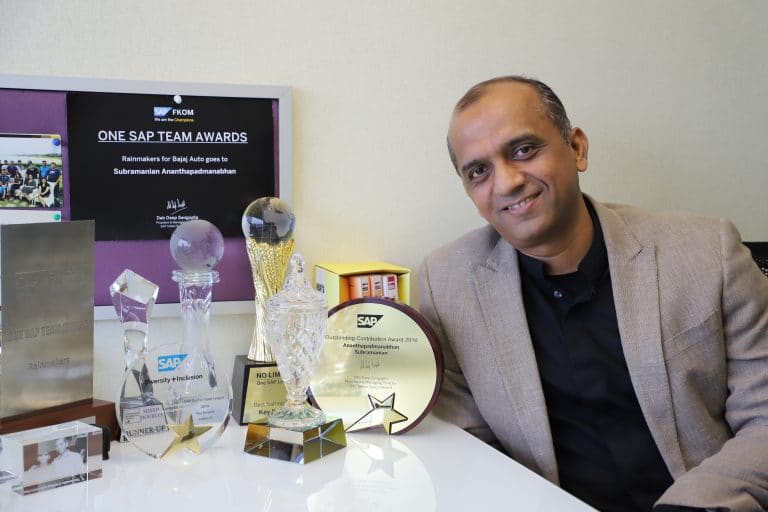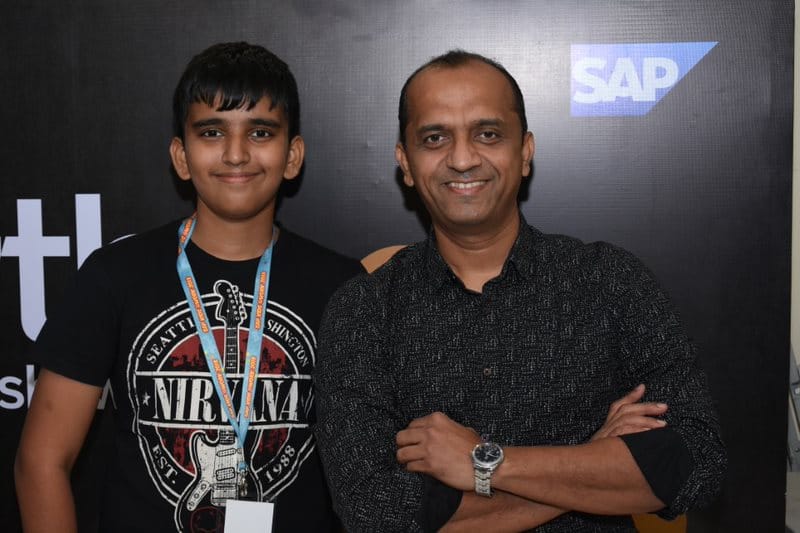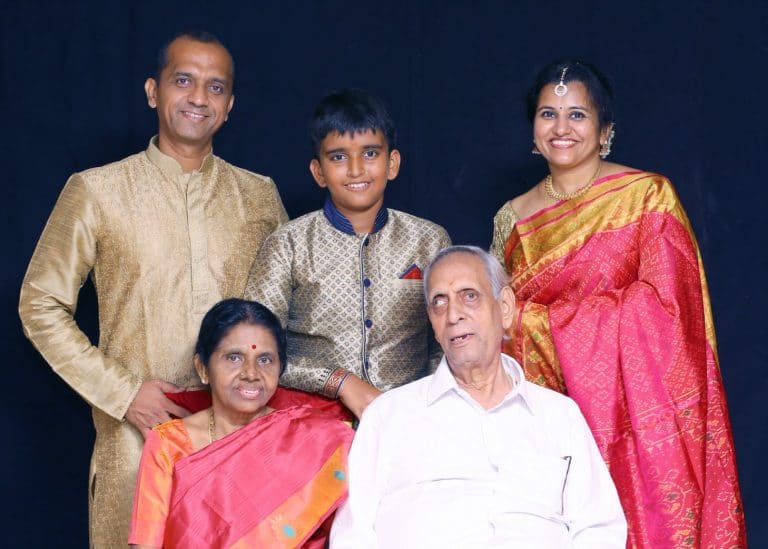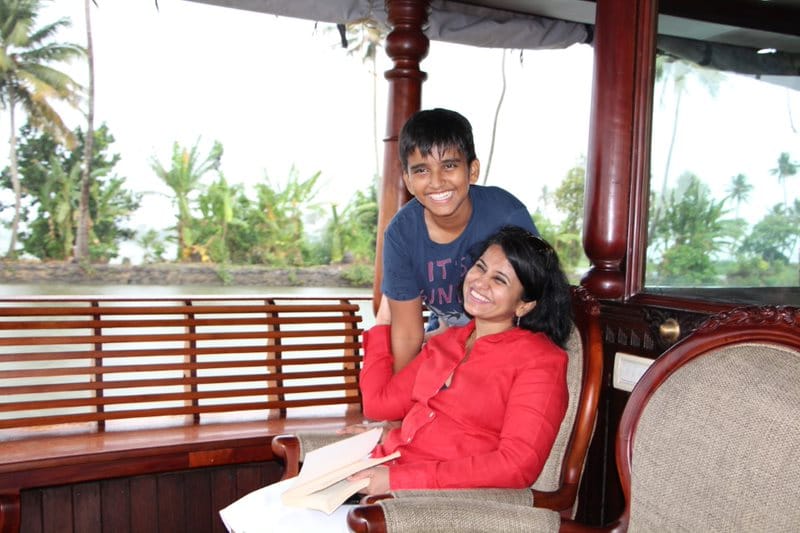He’s known universally as Subbu, but he reveals with a laugh that he’s one of those rare people whose initials, appropriately enough, are SAP.

Subramanian (‘Subbu’) Ananthapadmanabhan, VP, Digital Core, Mumbai
“My full name is very long – Subramanian Ananthapadmanabhan,” he explains. “So a lot of my customers actually say that I’m the walking, talking SAP. After all, those are my real initials. So they say that when they’re talking to SAP, they’re not just talking to a company, they’re talking to a man who is SAP as well. Maybe I was destined to be at SAP!
“To date, I’ve spent about 24 years here and all of that time has been spent in software. One thing that drew me to SAP was the belief that when you think you’re the best, you’d better be working for the best.
“I used to be at Oracle before and I used to see the struggle that Oracle had when they were talking to enterprise customers for ERP. They were very strong in database and Microsoft were very strong in office applications, but if you’re going to be in the enterprise space, you need to be with the leader. My personality is such that I don’t know what failure is, and that’s been a trait since my childhood. Anything and everything that I’ve completed, I’ve always given it a thousand per cent.
“I can actually count on the fingers of one hand the number of losses I’ve had in the working world, from a sales standpoint. I’ve been in sales all through, except for the first two years of my career and the number of losses have been very few, 24 years later. I have not known failure and God forbid, I don’t want to know failure. So at that point in my life seven and a half years ago, I was very clear that if I considered myself good, I had to be working for the best company in the world. That’s what drew me to SAP.
“It just so happened that the week before I joined SAP, I fell and fractured my leg. I was raring to go but I was in a hospital bed, and I even signed the joining documents from my hospital room. I started off my first interaction with the team from home. My entire team used to come over and there were at least five occasions when this happened because I was completely immobilized for six weeks. I used to do the reviews and the forecast calls from home. So I actually saw the office for the first time about two months after I joined SAP, even though I had already met every member of my team on multiple occasions before that. But it was about eight weeks before I stepped into the office building.
“It was immediately apparent that the beautiful thing about SAP is the special energy that is shared all the way up to the CEO. You could almost describe it as a positive hyperactivity, and it’s derived from the fact that nobody here likes to lose. That was very evident the moment I got here.
“That positivity about SAP is extraordinary. A few other things stood out for me. Everybody that I saw around me was a successful man or woman. Everybody. There was an element of joy as far as you could see. The second thing is that everything seemed so simple. Because of where I came from, this was a deliverance for me. It was the simplest I had ever seen in terms of compensation, of approvals, of running the business. The entire focus was on the customers. There was no requirement to spend time internally, because everything was crystal clear. Nobody could hide under any kind of shadow and nobody needed to waste any time at all doing internal politicking. It was that beautiful. Here was a company that was extremely simple and extremely customer focused, with the underlying atmosphere of total positivity. Everybody you spoke to had high regard for the company, for the solutions, and for the management.

Employee recognition awards and career success at SAP
“I didn’t have an interview when I joined SAP, because at the time when I joined there was a lot of movement between Oracle and SAP. A lot of people were coming from Oracle to join SAP. So I was picked up and told, please join. I just walked in and when I walked in, there was no need for introductions here because I actually knew more than half the people on the floor.
“My very first job after my Masters was in IT. I joined Wipro and I was the first person to be selected from campus. In 1996, when I graduated from my MBA, IT was the employment hotbed, leading the way in recruitments. I just happened to be in technology, so to be straight up, IT was just about coming in. I was drawn towards the human relationships and personal connections in the industry. I was very clear that I wanted to be in a role where I could influence instead of waiting for the market to pick up on the basis of marketing initiatives or advertising initiatives. I consider myself quite creative and I wanted to work in a one-on-one setting where I could really make a difference. That’s how I agreed to join Wipro, and from then on I’ve only ever worked in IT.
“Even as a child, I was drawn to technology. I always loved the fact that it was possible to automate and take the manual stuff out of the labor equation. Back in the days when there were a lot of science fiction movies, I always used to think that there’d come a time when robots would take over. Back then, the terms ‘robotics’ and ‘artificial intelligence’ did not really exist, but I was drawn to the concept of how automation would change the way we were accustomed to living our lives.
“In the early days, the industry was just selling or peddling computers and hardware devices but as soon as I got into software I realized that it could provide answers for every problem. Unfortunately those kind of opportunities only existed outside India at the time – because Indian customers used to buy out-of-the-box package applications. But that was the driving factor that pushed me deeper into technology. I was driven by the need to find ways in which to change the world through technology. At its very basis, that was my desire to make the world run better, which explains why I fitted in so neatly to the SAP way of thinking. The whole SAP ethos mirrors my overall philosophy. I don’t ever see myself working for any other company apart from SAP.
“In my childhood, I actually had two dream jobs and while they may have seemed diverse, they actually converged. The first aspiration in my very young days was to serve in the armed forces because I wanted to take care of everyone around me and I guess you could say I wanted to be a hero. And then when I moved out of school and into college, this might sound strange, but I forever visualized myself as a rabble-rousing leader, a motivational speaker around whom people would rally. I wanted to bring immense value for people. At that time I wasn’t as comfortable or as accomplished in terms of spoken English, which has improved considerably in the last 15 years, giving me the confidence to stand up and talk in front of any audience. If you can draw a connection between those two dreams of mine, it comes down to taking care of people and having the energy to make sure that everybody around me is given an equal opportunity to shine in a way in which I can actually take that tide along with me.
“SAP gives me the chance to do exactly that. It is a beautiful place to do that. It’s true to say that customers here are friends for life. I may have had different experiences because I work for product companies, but all of my customers, even those who change jobs, have only been working on SAP systems. For them, SAP has been part of their life for 20 or 25 years and SAP has made their careers, bringing them the success that they have today. They have a deep and immense respect for SAP and that respect is evident on a personal level as well, which is what creates friends for life. The relationships that you make at SAP will never die because they have an association with the product as well as with the person at the same time. When we add value to them, the connection really is cemented. To give you an example of this – outside of the office I have had numerous personal invitations from customers for their personal celebrations, which is highly unusual in professional life. But that’s the bond that SAP creates.
“I used to run a team of 40 people and we were extremely proud of the energy that we brought to our market unit. One of the key parts for me was to raise a team that would be powerful enough, to be proud and to be able to stand in front of customers and negotiate in a meaningful way. It’s almost like positive arrogance, and being able to carry it everywhere. You need to wear that on your sleeve. While we were building the team, we knew that the ‘why’ part of the equation was very important, because not everyone works for money. What we sell, we know. How we sell, we know. But why we were doing it was very important and that’s the reason that the ‘why’ element had to be linked to purpose.

A proud moment for Subbu and his son
“We go around saying that we make the world run better, but what exactly we do to contribute to the world was not really a question that has been answered for a lot of people. With this in mind – and it was the first time that this ever happened at SAP India – I took my entire team of 40 people and brought them into Mumbai, where we invested three quarters of a day setting up a Code Unnati center. We inaugurated this in a place called Dharavi, which is Asia’s largest slum.
“We set up the Code Unnati center for underprivileged sections of society and taught them scratch programming. Even though it was a working day for us, we introduced several of them to programming and we could see straight away that there were converts there – people who could never have believed that they would ever do this in their lifetime. They were completely touched. There was real gratitude. It gave us a real feeling of yes, I’m actually doing something for the betterment of the world. There was a growing realization that each of us was really able to contribute to this. Even now, some of my colleagues tell me they are so grateful for the fact that we opened their eyes to something that they never thought they would do – giving back to society in such a meaningful way. Now we plan to take it a lot further by doing it with extended teams, so that we’re all in it together in terms of volunteering.
“I’ve also agreed to do an employee engagement project for the entire company and not just my LOB. In addition, we do a volunteering workshop exercise once a year and I’m planning to conduct very specific Code Unnati workshops for the entire company, in different blocks of course. This will help people feel that they’re really making a difference to society. I want to institutionalize that instead of restricting it to just one team.
“Making a difference is just one element of this. I love to see that I’ve added value to the team. I love to see the gratitude and respect in the eyes of people, truly indicating that their time spent with me has been valuable or has been a value-add for them. Not everything appeals to everyone, so you have to do different things for different people. The element of purpose is always uniform across what we do, while the element of teaching or learning appeals to people in different ways.
“So what I do during the course of the year is not just this, I also invest time in running the young talent program in the country. I take all the Academy graduates out in the last quarter with 14 of my senior managers into a room to run a half-day experience workshop on negotiation skills. These are real-life negotiation situations, based on our experiences over many years and designed to give them a genuine flavor of what to expect. That’s not something you can get in any textbook. You simply cannot get 14 senior people together in a room in Q4, talking to you about what negotiation is all about, based on the depth of their cumulative experience. You get a real sense of immense satisfaction from the Academy graduates.
“In addition to that, wherever there is an opportunity, I spend time mentoring them on how they can improve themselves for the next year. I set up one-on-one meetings for them with some of my key leaders to tell them what they need to improve on when they branch out into different roles. This brings elements of acceptability, gratitude and respect. What I like to do is to make sure that when I am no longer involved in their lives, this is a mark or a lasting influence that I’ve made on their lives. That’s really what keeps me going on a daily basis.
“Doing something like this, to make a difference to others who are just beginning their careers, goes back to the people who influenced me. In my formative years, my mother (sitting, in this photograph) had a huge influence on me and although she is 76 today, anything and everything has to be just and fair in her eyes if it’s worth spending time on. It doesn’t matter what is entails. She doesn’t flinch, ever. If there is injustice, she will raise her voice and will do everything in her power to ensure that the matter is settled properly. So yes, I certainly draw a lot of inspiration from the way I’ve been brought up. You have to be fair to everyone around you and if people are going to respect you, then you need to draw on your own experiences to give back in whatever way you can.

Subbu and his family
“I also have an interesting SAP story to tell in the context of my father’s medical situation a few years ago. When my dad was hospitalized in 2014, it was Q4 and we had a $3 million deal on the table for a start-up. There was no way that anybody could have stepped into my shoes at that particular point in time because it was too far into the engagement cycle. I had no choice but to find a way to balance it out. Yes, I had to be there in the hospital with my father but I simultaneously needed to be an integral part of the engagement process, even though I couldn’t physically be there in the office.
“I am my parents’ only son, and I had to strike the right balance, not just for my family, but for SAP too. The first thing we did was that we got my father into a hospital suite, so he was in one room while I used the other room as my office. None of the people at SAP were aware that the reviews and the calls that were being answered were actually being attended to in a hospital. Not one of them knew that.
“The only person who was aware of this unusual situation was the person to whom I was selling, because he had to know that I could not be there 24/7. Do you know what this gentleman did? He actually volunteered to come to the hospital to negotiate the deal. That was something that will remain with me throughout my life because it was a net new deal and we had struck a chord in the relationship to the extent where he said, ‘I’ll come over to the hospital and we’ll sort it out there.’

Family moments for Subbu are an integral part of his life
“Of course, I didn’t allow that, so we went back to his office at a suitable time to complete it, but that experience is something that will remain with me for a long time. That really does speak volumes about the extent of relationship-building on which I pride myself.”
This article is number 37 in a series of employee stories to mark SAP’s 30 years in APJ and was featured on SAP APJ Regional News Center.



